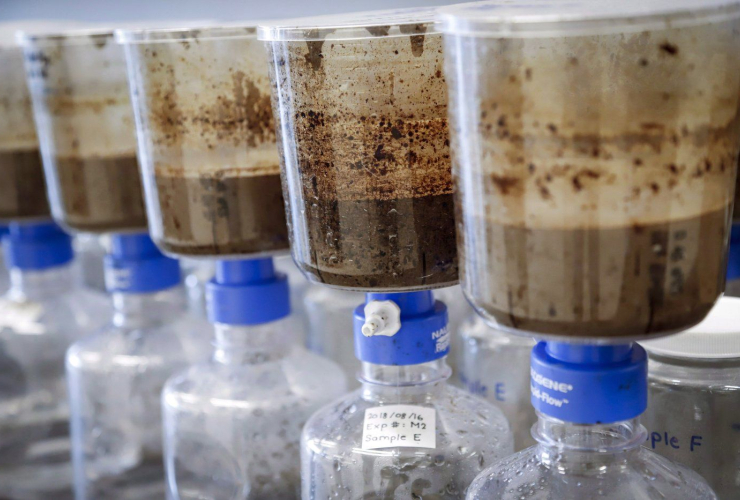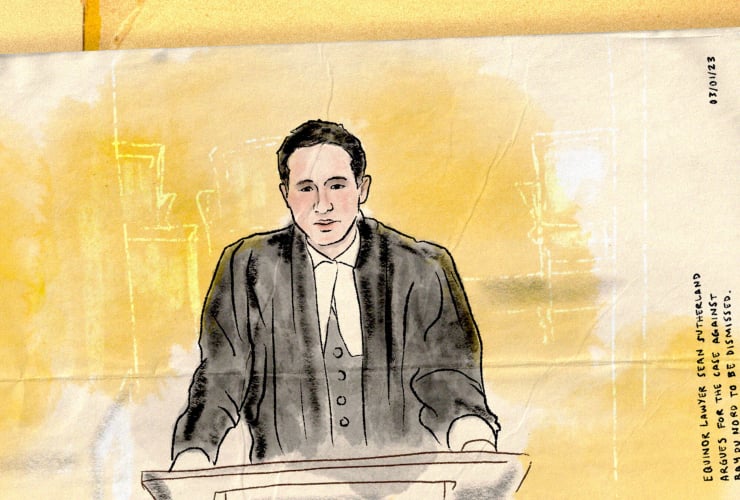Arlyn Charlie’s grandmother has lived on the land since she was a child. Many decades ago, her parents took her to their remote fishing camp on the Peel River in the Northwest Territories when she was still a child, so the government couldn’t take her to residential school.
Charlie’s film about the changing Peel River watershed, titled Dèeddhoo Gòonlii, begins with this story. And through the eyes of his grandmother, who lived decades on the land, the viewer learns how much the climate has shifted.
The film jumps between archival footage, monologues by Charlie and interviews with family members on how unpredictable the land has become in a short period of time. Much of the film was shot at the family’s fishing camp.
Among the most drastic changes have been caribou migrations, a species that has become precarious. The animals’ migration paths have changed — even Charlie hasn’t seen them since 2015. They resurfaced this year, and with them were new faces. Muskox, rarely seen before on the territories, have emerged as competitors for feeding grounds.
Permafrost is also melting. There used to be three feet of ice under the ground, Charlie said. Now that is all gone and it’s causing landslides: “The mountains are coming down.”
Charlie told Canada’s National Observer how fluctuating water levels have changed ancestral fishing practices.
The fishing net must be nestled in a swirling part of the river to both catch fish and keep the net clean, Charlie’s grandmother explains in the film. Now, the net can easily be taken out by debris falling into the river, or if it remains full of dirt, the fish will see it and stay away, Charlie said.
Rising water temperatures also ensure fish nestle deeper in the riverbed, further complicating harvests.
The film was made after a Supreme Court decision First Nations in Yukon won for protections in the Peel River watershed. The First Nations land use plan protected 80 per cent of the territory, while Yukon’s plan only protected 30 per cent.
The unanimous decision said the territorial government broke its treaty obligations in regards to the Gwich’in Tribal Council’s modern treaty, according to CBC News.
Now Charlie is asking how one fights climate change if you can’t take it to court? There are fears that future resource development could arise and further disrupt the land, particularly given the federal government’s new Critical Mineral Strategy.
“So we're trying to figure out that right now, especially in terms of climate change because of all the things that I've seen in my lifetime. And I'm quite young relative to everybody else in the film,” Charlie said.
Charlie never saw himself as a climate advocate. His current job is with the Gwich’in Tribal Council in its cultural heritage department, but there’s an overlap now. What will happen to culture and heritage without the land?
“It's going to need to adapt, it's going to need to change but I think the most important thing is that we don't lose the heart of it, we don't lose identity,” he said.
Matteo Cimellaro / Canada’s National Observer / Local Journalism Initiative
Updates and corrections
| Corrections policyA previous version of this article omitted the title of Arlyn Charlie's film. The film's title is Dèeddhoo Gòonlii. A previous version of this article also stated that Charlie's grandmother's fishing camp was in the Yukon, when in fact, it's in the Northwest Territories.







Comments